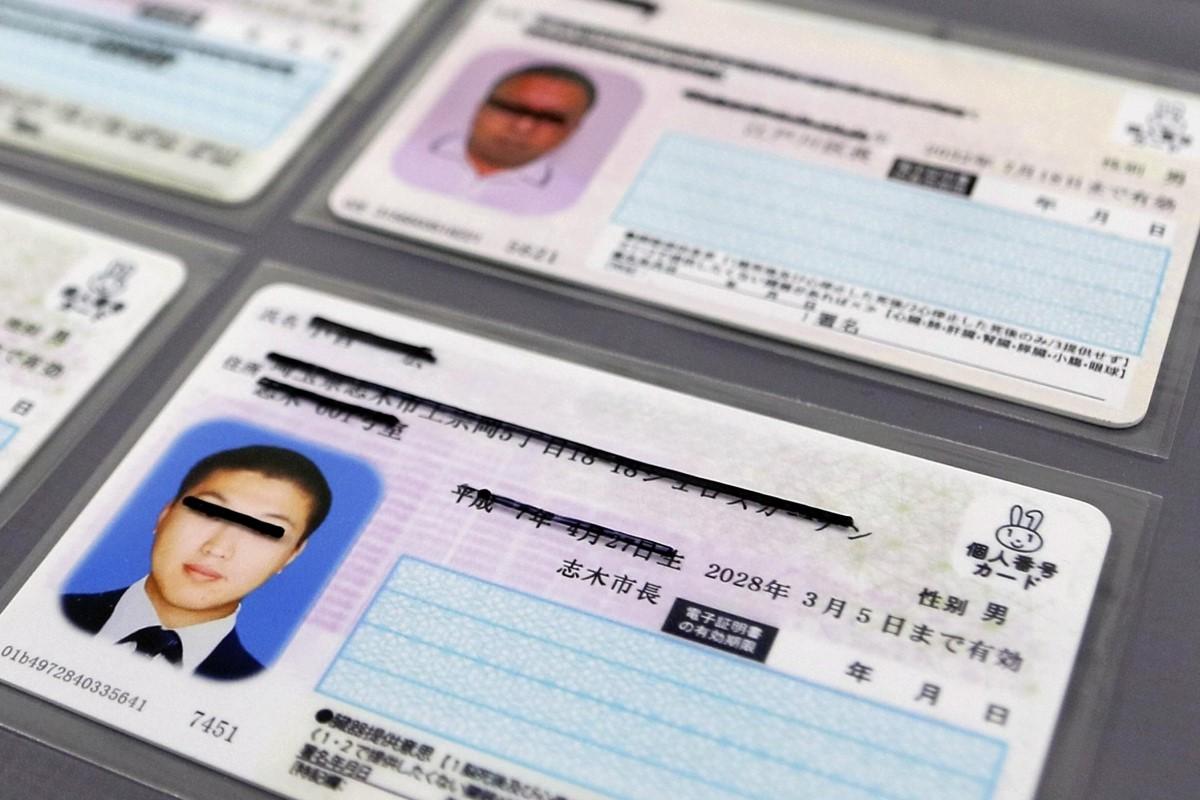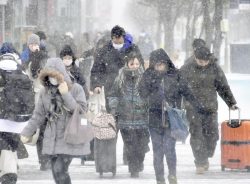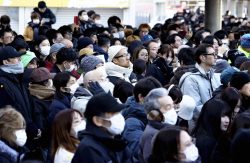Forgery And Sale Of My Number Cards Becoming More Common; Backed By Foreign Crime Rings, Fraudsters Print Fake Cards At Home

Forged My Number Cards seized by the Metropolitan Police Department are seen at the Ikebukuro Police Station on May 15.
6:00 JST, July 8, 2024
In recent years, an ongoing problem has emerged in Japan: the continuing appearance of fraudulent My Number cards. These abuses seem to arise from the lax way in which identity checks are performed during various procedures. Cards reportedly circulate on social media for ¥10,000 to ¥20,000. A Chinese defendant agreed to an interview, testifying to how these forgeries work.
Up to 60 cards
“The work is simple and requires no preparation or skills. You can make a card in just 5 minutes,” said a Chinese woman, 27, who was arrested by the Metropolitan Police Department last December on charges including suspicion of forging sealed official documents. She spoke from the Tokyo Detention House. She was sentenced to three years in prison in her first trial and is currently appealing.
The woman committed her first forgery around June last year. After talking to a friend about financial difficulties, she was introduced to a job making cards. She contacted a person called “Boss” on the Chinese social media platform WeChat and received instructions on how to forge cards. A computer and printer for the work were delivered to her home, and personal information was sent to her via email.
The work consisted of simply printing personal information data on both sides of a white card with a fake IC chip embedded. She would often make 60 cards in a day, which she would then send to specified domestic addresses. For one day’s work, she would receive electronic money equivalent to about ¥12,000 to ¥16,000.
The MPD investigated, suspecting that the person giving instructions was in China. On May 15, they arrested two Chinese nationals on charges including suspicion of forging sealed official documents for allegedly making fake My Number cards at the request of the same group. They believe the forged cards may have been used for purposes such as setting up mobile phone contracts.
Many rely on visual checks
The My Number card program began in 2016, and cards have been issued to about 99 million Japanese people, about 80% of the population, and to about 2.9 million foreigners as of the end of April this year.
The cards offer a high degree of convenience for purposes other than administrative services as well. They are used as proof of identity for setting up mobile phone contracts, opening bank accounts, and in other situations. However, it seems that many places only use the cards to visually confirm holders’ identities. According to the Japanese Bankers Association, the introduction of devices that can verify identity by reading IC chip information is limited to some major banks.
In March last year, a Vietnamese man was arrested by the MPD for attempting to fraudulently obtain a smartphone contract with a forged My Number card at a mobile phone store in Katsushika Ward, Tokyo. Forged My Number cards are reportedly being bought and sold on Chinese and Vietnamese social media for ¥10,000 to ¥20,000.
“The fraud we have discovered so far is likely just the tip of the iceberg,” a senior MPD official said.
Foreign Organizations
In the past, residence cards, which are issued to those staying for more than three months, were the type of forged documents most commonly used by foreigners. According to the National Police Agency, in 2020, a total of 790 cases of possession of forged residence cards and other offenses were uncovered. In response, in the same year, the Immigration Services Agency began providing an app that can determine whether or not a card is authentic. It has since been adopted by some entities such as public institutions and companies accepting technical intern trainees.
On the other hand, advanced anti-counterfeiting measures are incorporated into the My Number card itself: for example, special printing techniques are used on part of the card’s surface. The Internal Affairs and Communications Ministry has therefore not devoted much energy to promoting the use of authentication software. In response to the recent string of forgery cases, on May 17 the ministry and the Digital Agency provided a document to private businesses which showed how to identify counterfeit cards.
The MPD is on alert, suspecting that foreign organizations that previously forged residence cards are now expanding their forgery and sales activities to include My Number cards.
A surreptitious smartphone theft
There have also been cases of mobile phones being hijacked using forged My Number cards. On April 17, Yutaka Kazama, a member of the Tokyo Metropolitan Assembly from the Constitutional Democratic Party of Japan, received an email from the company that operates the payment app PayPay, notifying him of a password reset that he had no recollection of.
When he became unable to make calls on his smartphone, he consulted a mobile phone store and discovered that someone had used a My Number card in his name to move his account to a different phone at a store in Nagoya.
He immediately suspended his phone service, but about ¥100,000 had already been spent using PayPay and the mobile carrier’s payment service.
The store in Nagoya had only visually checked the My Number card presented by the unidentified individual. Kazama said, “Businesses that use My Number cards to check customers’ identities should start bringing in devices that authenticate the IC chip and also using other forms of ID.”
Top Articles in Society
-

JAL, ANA Cancel Flights During 3-day Holiday Weekend due to Blizzard
-

Man Infected with Measles May Have Come in Contact with Many People in Tokyo, Went to Store, Restaurant Around When Symptoms Emerged
-

Australian Woman Dies After Mishap on Ski Lift in Nagano Prefecture
-

Foreign Snowboarder in Serious Condition After Hanging in Midair from Chairlift in Nagano Prefecture
-

Record-Breaking Snow Cripples Public Transport in Hokkaido; 7,000 People Stay Overnight at New Chitose Airport
JN ACCESS RANKING
-

JAL, ANA Cancel Flights During 3-day Holiday Weekend due to Blizzard
-

Japan Institute to Use Domestic Commercial Optical Lattice Clock to Set Japan Standard Time
-

China Eyes Rare Earth Foothold in Malaysia to Maintain Dominance, Counter Japan, U.S.
-

Man Infected with Measles May Have Come in Contact with Many People in Tokyo, Went to Store, Restaurant Around When Symptoms Emerged
-

Japan, Qatar Ministers Agree on Need for Stable Energy Supplies; Motegi, Qatari Prime Minister Al-Thani Affirm Commitment to Cooperation
























